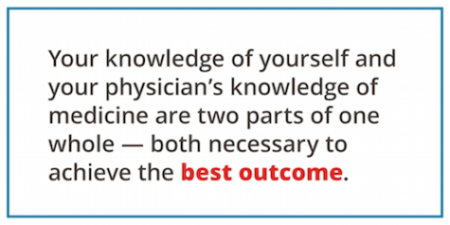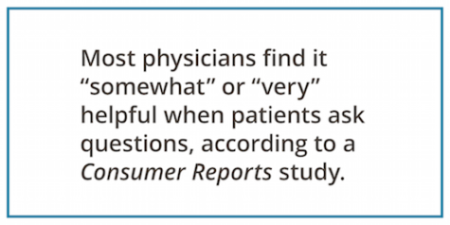It wasn’t long ago — before the rise of the Internet — when physicians were the only resource for medical consultation. There was no “Dr. Google” to go to for the little things, such as topical treatments for an insect bite. Facebook moms’ groups were not around to ping for advice when your child had a fever. Back in the day, you made an appointment with the doctor and relied on his or her credentials, expertise, and experience to guide you and your loved ones back to good health.

Nowadays, one in three U.S. adults have gone online to determine what medical condition they or someone else might have, according to a national survey by the Pew Research Center’s Internet & American Life Project. However, the top health-related answers on search engines, such as Google, can be incorrect and even misleading. Just because it was “published” online, does not mean that it was peer-reviewed and validated by the medical field. This trend can be troublesome for physicians who see patients coming in armed with misinformation.
Technology isn’t what’s ailing our ability to access good healthcare guidance. In fact, there are other ways that you can utilize today’s technology to both your and your physician’s advantage. It starts by being your own health advocate — and viewing your well-being as your responsibility, not just your primary care physician’s responsibility. Consider your knowledge of your body and health and your physician’s knowledge of medicine as two parts of one whole. Both are necessary to achieve the best possible outcomes.
Here are five ways to become a better patient for your doctor — and the greatest health advocate for yourself.
1. Keep a record of your family’s medical history.
Genetics, lifestyle, and environment all play a role in our health, according the U.S. National Library of Medicine. Your family’s medical history can help you identify common health issues for which you may be at risk, such as heart disease, high blood pressure, stroke, cancer, or diabetes. Just because a family member has experienced a certain medical condition does not guarantee that you will, too. But prevention starts with awareness.
A complete family medical record consists of information from three generations of relatives, including:
- Children
- Siblings
- Parents
- Aunts and uncles
- Nieces and nephews
The best way to gather this information is to talk to your relatives. What medical issues have they experienced and when did they occur? Conversely, if you’ve been diagnosed with a medical condition, it’s important to share that information with your family, too, so that they can get screened if necessary.
2. Schedule preventative check-ups.
Regular check-ups can help you catch a potential issue before it becomes a problem. Which types of check-ups might you need? It depends on several factors, such as your gender, age, health, and family history. Some examples may include an annual exam, mammogram, colonoscopy, or prostate exam.
Talk to your physician to determine which exams you may need and how frequently. Then make sure to keep copies of all of your health records in your personal files at home. Before each visit, review your history and bring a copy of the file with you, in case any questions arise.
The Centers for Disease Control and Prevention also has a great checklist of things to do before your next check-up.
3. Know your numbers.
A health screening, also known as a “biometric screening,” can provide you with key insights into your health status.
Some of the metrics that might be measured include:
- Cholesterol
- Blood pressure
- Heart rate
- Blood glucose levels
- Body composition
At ADURO, we work directly with organizations to host onsite health screenings. Individuals can then take their information and share it with a physician, use it as inspiration to make important lifestyle changes, or celebrate the fact that they’re on the right track.
4. Don’t be afraid to ask your physician questions.
Physicians want you to ask questions. Really, they do. In a Consumer Reports study of 660 primary care physicians, most said that it is “somewhat” or “very” helpful for patients to ask them questions or to periodically question their recommendations. Only 4 percent found that strategy to be unhelpful.

However, as we all know, time with the physician is limited. The most common amount of time physicians spend with patients is just 13-24 minutes, according to Medscape’s 2017 Physician Compensation Report. To make the most of that time, plan ahead. Write your questions out in advance, and bring a notebook with you. Write down the date, time, physician’s name, doctor’s office, and any notes about their recommendations.
It’s the best way to ensure that you don’t miss anything important. Additionally, it can strengthen the physician-patient relationship, demonstrating that you’re keeping an open mind and have an interest in what they have to say.
5. Adopt healthy habits.
The best medicine you’ll ever receive doesn’t require a prescription. You can’t buy it over the counter. It doesn’t cost a thing, but it does take a little effort. It’s a healthy lifestyle.
Each morning, when we wake up, we have the power of choice. Sometimes those choices may seem small, such as swapping soda for water or going for a walk during your lunch break. Over time, those small choices become habits, which eventually become engrained in our lifestyle. It is these lifestyle choices which determine both the quality and the longevity of our lives.
Practice healthy living by eating right and exercising regularly. It can help to protect you from common chronic conditions, such as heart disease, hypertension (high blood pressure), or type 2 diabetes.
What does a healthy diet and exercise routine look like? Generally speaking, strive to fill your grocery cart with foods that are wholesome and as close to nature as possible. In regard to exercise, the Department of Health and Human Services recommends at least 150 minutes of moderate aerobic activity or 75 minutes of vigorous aerobic activity per week. It’s also important to get a good night’s sleep and drink water throughout the day.
By becoming your own health advocate, you’ll have a greater sense of control and confidence in the decisions you and your physician make together.
